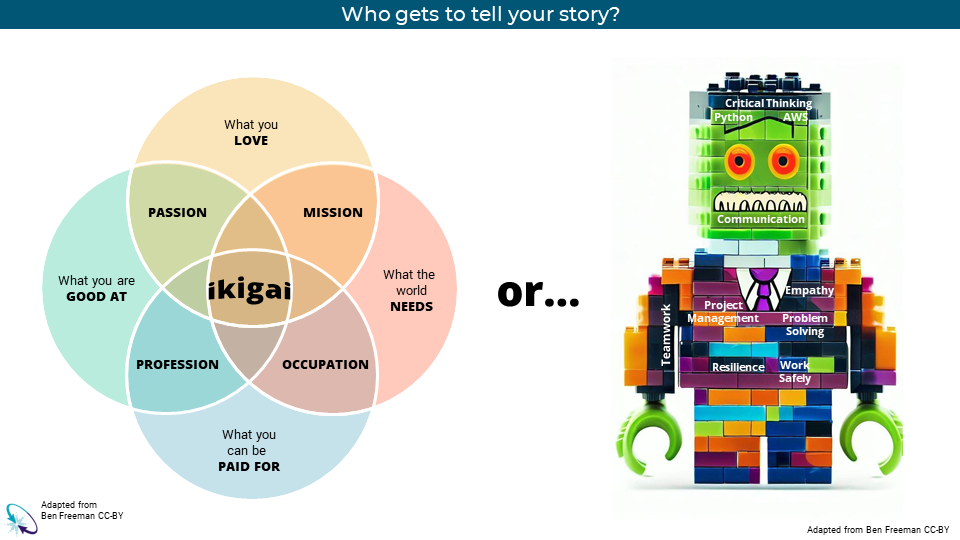(From a pre-conference webinar for Badge Summit in July 2023. See full deck with Notes, part of my badge portfolio, or recorded video below.)
The title for this post was inspired by a recent story on CBC Radio’s As It Happens about using brainwaves to record and reproduce music with the help of AI, specifically the well-known hook in the famous Pink Floyd song.
As usual, I’m arguing here for opening up the recognition of lifelong and lifewide learning with Open Badges, which can do SO much more than certify the delivery of ConEd courses as micro-credential certificates.
“Skill first!” – what could go wrong?
Skills-first approaches to development and recognition sound great, but skills frameworks, stacked credentials and software matching programs are best seen as logical abstractions of a complex reality rather than a comprehensive way to describe all the factors in play.
Let’s face it, we live in a VUCA world: Volatile. Uncertain. Complex. Ambiguous:
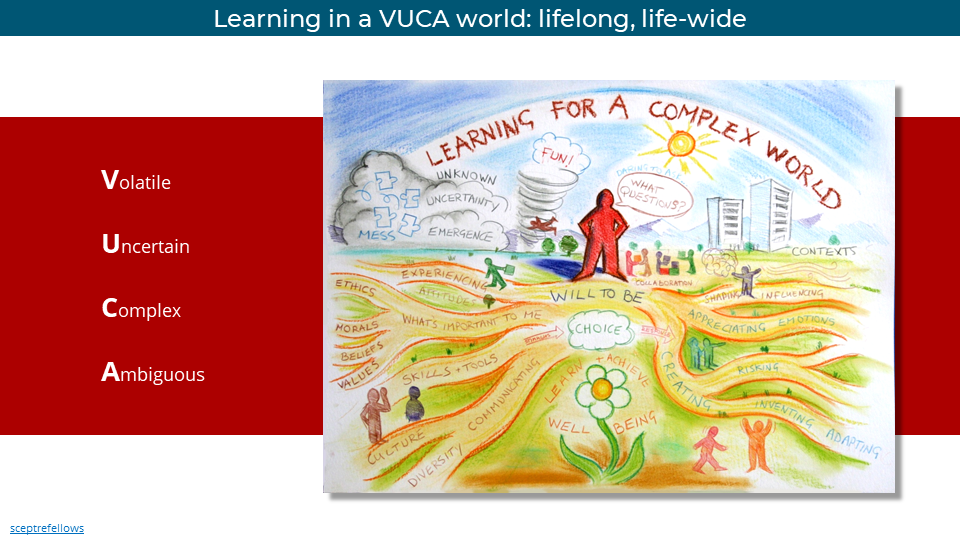
This is a world that steadfastly resists the compartmentalization of skills and knowledge into neat little bricks that can stack into tidy modular structures. We all have to navigate this world the best way we can, following our passions and interests and building our mojo, reacting to experience and balancing fuzzy options against each other, rather than following yellow brick roads to pre-determined futures.
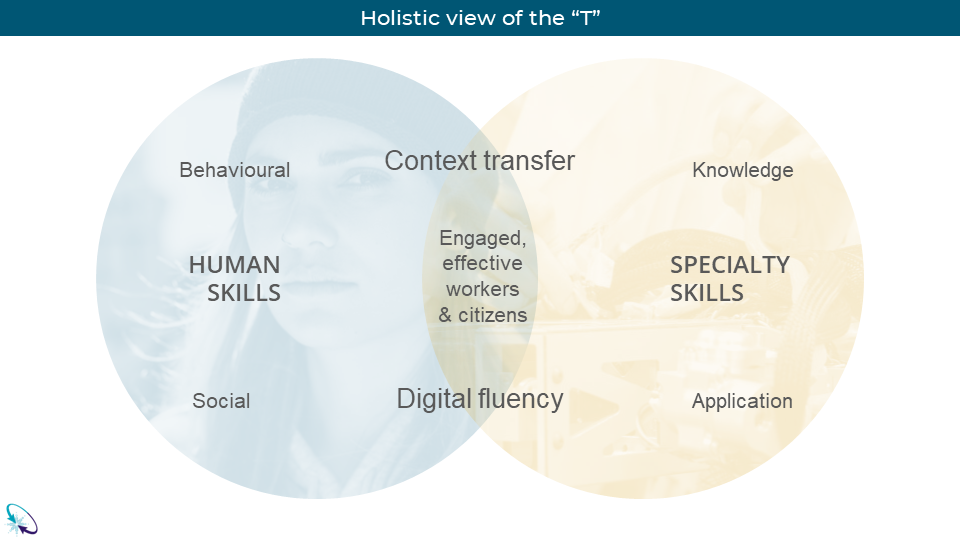
Focusing on “skills first” frameworks and stackable credentials can fragment, isolate, distort and confuse instead of making things more clear. Holistic approaches can bring skills together in activities, tasks and achievements, creating authentic narratives that can make lots more sense to learners and employers. Why not “human first”? We need to keep learners at the centre and think of them more as intriguing mixtures of lived experience, engageable support and future potential than as stacked containers of delivered skills. Let’s try to do no harm…
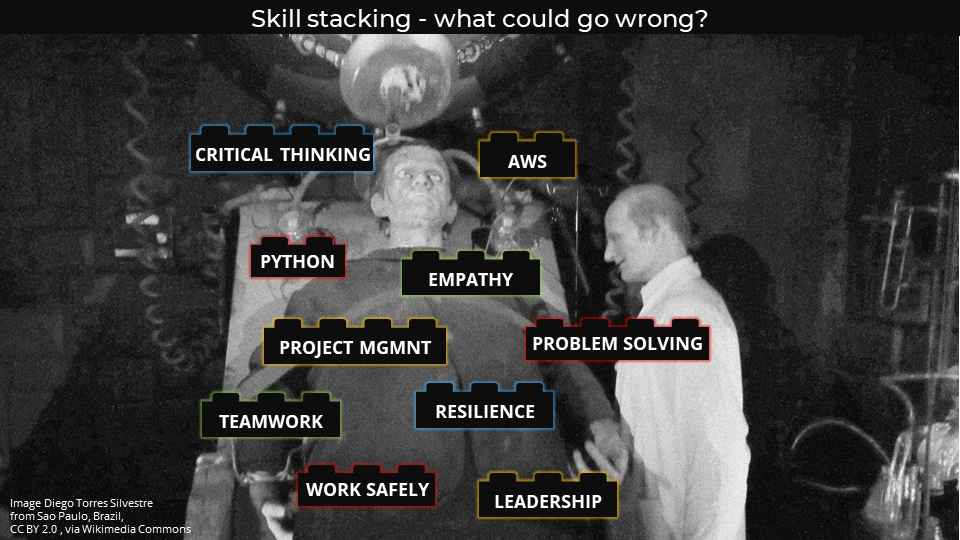
The 2022 Digital Credentials Consortium paper, Credentials to Employment: The Last Mile warned us that mileage will vary in that last mile toward the future promise of micro-credentials for employment from the current reality. Most employers still aren’t aware of micro-credentials, much less on board, and that’s especially true for smaller (SME) employers, who make up the bulk of the economy. I hear this also from industry associations here in Canada. Old selection methods still dominate, especially for busy SMEs: job ads, resumes, interviews, referrals. Sharing micro-credentials to LinkedIn is still a platform hack. Digital wallets are still more about buying coffee at Starbucks than sharing credentials. In general, there’s a lack of demand and interoperable tools for using micro-credentials in talent and employment pipelines: lots more push from educators and ed tech technologists than pull from employers. It’s more like a skills tech duststorm than a working skills ecosystem – we are at a difficult point in the Gartner Hype Cycle, straining to reach the plateau of productivity.
And did we really think that Micro-credential A was all about being a sure ticket to Job B? Is it really that instrumental? Aren’t mico-credentials just another signal?
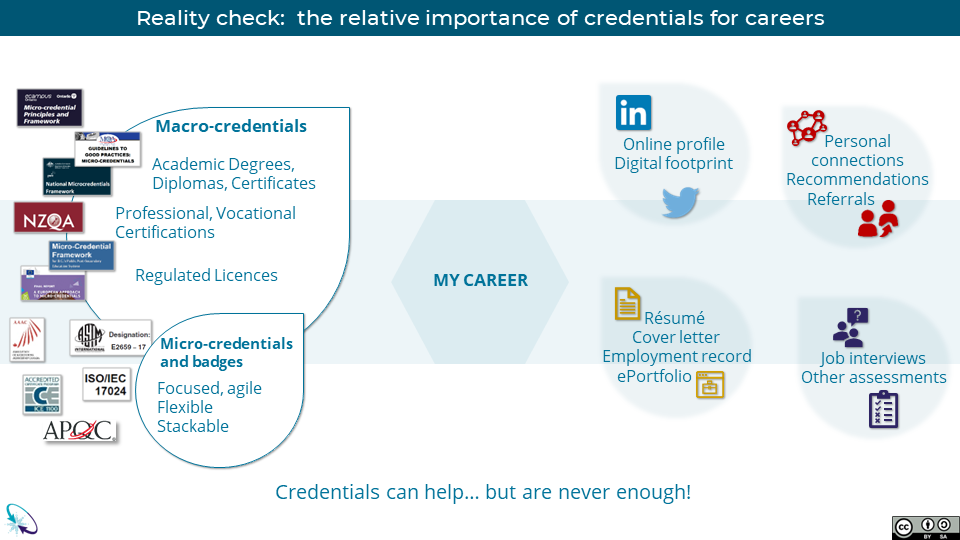
Most micro-credentials are based on Open Badges. They represent a very formal fork of the original comprehensive vision, which was to recognize learning and achievement that could happen anywhere and make it visible and portable, with some verifiability. Yes, that can include formal and non-formal courses, but you can’t take a course about everything. Far too many micro-credentials are based on courses. Courses are the “hammer solution” to nail the skills problem – especially automated e-learning courses that can pump out micro-credentials like Reichsmarks in the Weimar Republic. The 70:20:10 model is a useful way of making the general point:
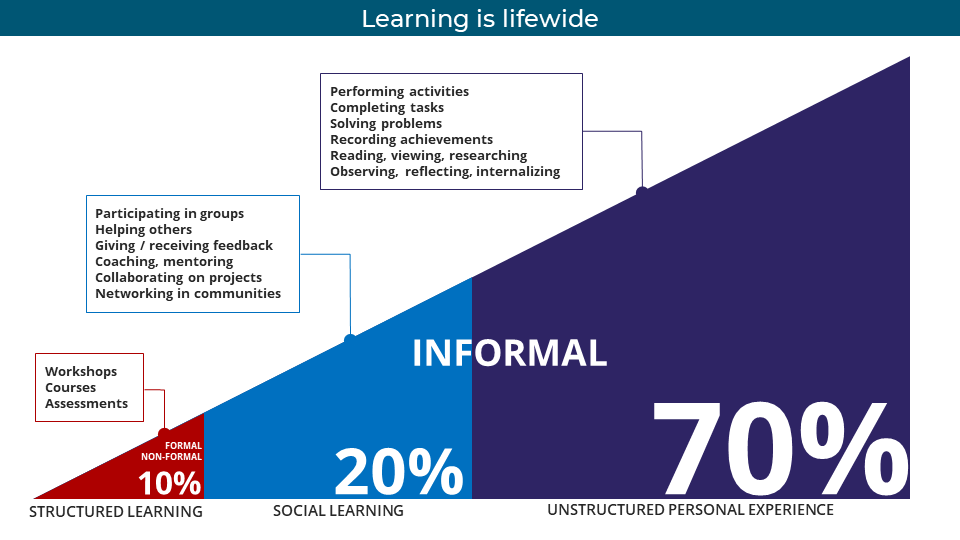
Sometimes you have to learn from someone else, sometimes you work and learn in a group or a community, sometimes you have to fake it until you make it, maybe with a little help from YouTube.
In post-secondary, there’s a push toward applied hands-on experiential learning, via different types of simulation or more authentically as Work Integrated Learning or Work Based Learning (what Beverley Oliver, an early thought leader in the MC space, dubbed Learning Integrated Work). Still not very much authentic recognition of the unstructured learning that takes place in those contexts, but that’s for another blog post.
Let’s face it, a lot of learning takes place with others, in organizations and communities. Much of my thinking in the area has evolved based on the work of Etienne Wenger (now Wenger-Trayner) and his pioneering research on communities of practice related to workplace skills. And I’m grateful to Serge Ravet for bringing my attention back to him.
For Wenger, learning, especially lifewide learning is inherently social. This social theory of learning as making practical sense of uncertainty is very powerful lens for open recognition:
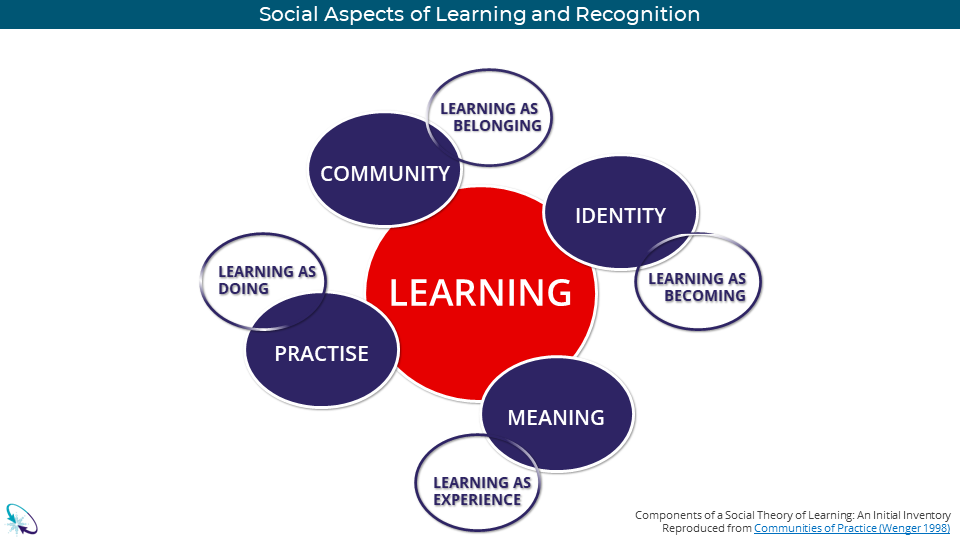
- Meaning is about making sense of experience, both individual and collective
- Practice is about shared approaches to knowledge and organizing work
- Community is about social constructs for participation
- Identity is about how learning changes who we are and what we become in communities
Skills frameworks are a way to map what’s known and as my colleague Serge Ravet would say, “the map is not the territory.”
Open Badges are flexible containers for recognition
They can recognize so many things, limited more by your imagination than by actual constraints… here are a few examples:
- Formal, non-formal or informal learning
- Skills, capabilities and/or knowledge
- Verified assessment, completion, participation, engagement or appreciation
- Professional status or less a formal identity in a community
- Claims made by accredited authorities, non-formal organizations, peers or learners themselves
- Values, ethics, interests, passions and goals
- Beyond individuals: group skills and achievements, learning organizations and growing communities of practice
Members of the international Open Recognition community of practice are exploring these models for opening up recognition, piloting use cases and scaling out initiatives that leverage value from a more inclusive perspective of human achievement and potential. We shared several of these models at this year’s Badge Summit in Boulder and plan to share even more at ePIC 2023 in Vienna Dec 6-8. ePIC is our annual touchstone – the flagship conference for the Open Recognition Alliance.
Digital course certificates are SUCH a small part of the big picture… let’s leave room for them, but let’s also leave some oxygen for more comprehensive ways to recognize human achievement.
So, instead of thinking badges = micro-credentials = pre-fab building blocks for aggregated-transcripts-as-skilled-people in a technocratic (many would say dystopian) vision of a master global skills framework…
What if we looked again at the original Mozilla vision of Open Badges as flexible containers for verifiable narratives of skills and achievement that can help their holders connect to new opportunities in their lives and careers?
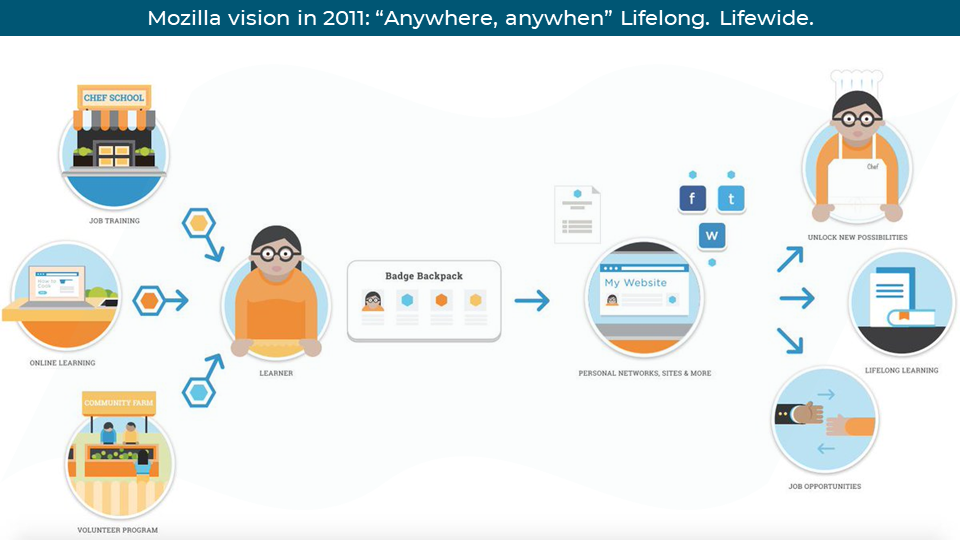
Linked Data, multi-dimensional knowledge graphs and fluid ontologies developed by Artificial Intelligence will provide increasing avenues for connection…
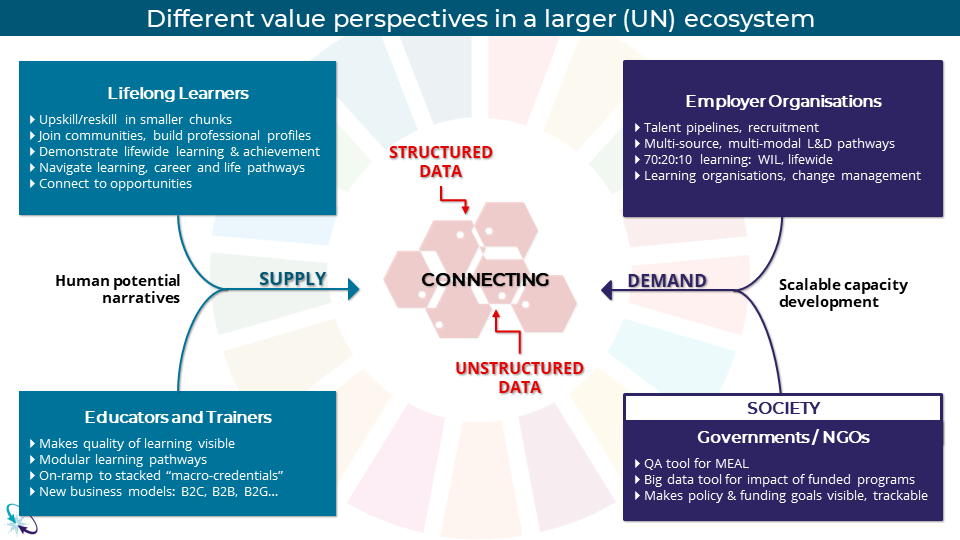
… but let’s make sure they’re worth connecting – their recipients need to connect to them first, so they can really “own” them to tell their own story in their own way, not just via bots and automated applicant tracking systems. Let’s keep humanity in the loop.
